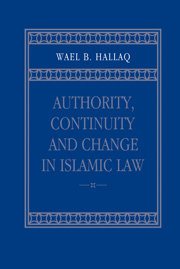Book contents
- Frontmatter
- Contents
- Preface
- 1 Juristic typologies: a framework for enquiry
- 2 Early ijtihād and the later construction of authority
- 3 The rise and augmentation of school authority
- 4 Taqlīd: authority, hermeneutics, and function
- 5 Operative terminology and the dynamics of legal doctrine
- 6 The jurisconsult, the author–jurist, and legal change
- Summary and conclusions
- Bibliography
- Index
Preface
Published online by Cambridge University Press: 27 July 2009
- Frontmatter
- Contents
- Preface
- 1 Juristic typologies: a framework for enquiry
- 2 Early ijtihād and the later construction of authority
- 3 The rise and augmentation of school authority
- 4 Taqlīd: authority, hermeneutics, and function
- 5 Operative terminology and the dynamics of legal doctrine
- 6 The jurisconsult, the author–jurist, and legal change
- Summary and conclusions
- Bibliography
- Index
Summary
To say that authority is the centerpiece of law is merely to state the obvious. Equally obvious therefore is the proposition that Islamic law – or any other law, for that matter – cannot be properly understood without an adequate awareness of the structure of authority that underlies it. It is this theme which constitutes the main preoccupation of the present work. In Islamic law, authority – which is at once religious and moral but mostly epistemic in nature – has always encompassed the power to set in motion the inherent processes of continuity and change. Continuity here, in the form of taqlīd, is hardly seen as “blind” or mindless acquiescence to the opinions of others, but rather as the reasoned and highly calculated insistence on abiding by a particular authoritative legal doctrine. In this general sense, taqlīd can be said to characterize all the major legal traditions, which are regarded as inherently disposed to accommodating change even as they are deemed, by their very nature, to be conservative; it is in fact taqlīd that makes these seemingly contradictory states of afiairs possible. For in law both continuity and change are two sides of the same coin, both involving the reasoned defense of a doctrine, with the difference that continuity requires the sustained defense of an established doctrine while change demands the defense of a new or, more often, a less authoritative one. Reasoned defense therefore is no more required in stimulating change than it is in preserving continuity.
- Type
- Chapter
- Information
- Authority, Continuity and Change in Islamic Law , pp. ix - xivPublisher: Cambridge University PressPrint publication year: 2001



